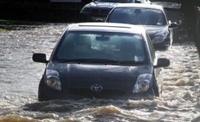This week, much of the United States endured the wrath of severe weather because a single system was able to travel from the Midwest all the way to the East Coast. Whether the impact was from hail, tornadoes or straight-line winds, momentum from this storm prompted meteorologists from every region along the Atlantic Ocean seaboard to issue a weather warning, CNN reported.
It is unclear how much federal or state funding will be allocated to Arkansas, Mississippi, Oklahoma, Alabama, Georgia and Florida, but damage in the Sunshine State specifically is estimated to cost more than $100 million. Pensacola in particular noted that Tuesday's rain total was the highest on record, dating back to 1879. By Wednesday, the community saw nearly two feet of rain flooding homes and roadways.
"The asphalt blew out, the sewer blew out, the gas blew out. It devastated homes right there. It was really almost — it was surreal," Mayor Ashton Hayward told CNN. "Obviously we're prepared for hurricanes but when you talk about flooding, Pensacola has never had this kind of flooding."
Many households climbed and waited on rooftops for local rescue teams, but one of the largest structures in Pensacola that was damaged during the storm was a corrections facility. A gas explosion killed two inmates and injured over a dozen others, the local authorities have yet to confirm if the gas explosion occurred in result of the flooding or severe weather, according to reports from NPR.
Governor Rick Scott decided to put Florida under a state of emergency because the rain's impact ruined so many homes. He explained that residents in Pensacola "have lost everything, and they didn't buy flood insurance because they didn't think they were in a flood area."
Even though significant rainfall is not the norm in Pensacola, that doesn't mean it won't ever happen. Business continuity consultants can help city and town officials devise a strategy to have smooth continuity of operations during any weather event.

